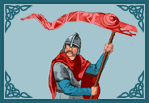 |
 |
|||
|
|
Serguan, probably a corruption of Gerguan, appears in the list of Kings of Gododdin as the eldest son of King Letan Luyddoc (of the Host) of Gododdin. If he is to be identified with Sir Gawain of Arthurian literature, then, in early Welsh legend, he was always called Gwalchmai, perhaps his original epithet. It means the Hawk of May. However, he was said to be a very handsome and charming young man who later acquired another epithet of Dafod Aur meaning "golden tongue". Arthurian literature provides several stories surrounding Gawain that betray the more historic character's northern roots: the Green Knight episode, his battle with Carl of Carlisle and his famous marriage amongst them. In the latter two stories, he is particularly associated with Caer-Ligualid (Carlisle). Next to nothing is actually known of his reign in Gododdin when he eventually succeeded his father. Tales of his knightly exploits abroad could indicate that he was largely an absentee-king. Perhaps he spent time conquering other lands for he is traditionally also associated with Galloway and Walwyn's Castle in Pembrokeshire, both of which were supposedly named after him. Gawain's character is sometimes merged with a Pembrokeshire saint called Govan, although this may simply be due to the similarity of their names. Following this identification, Gawain is said to have abdicated his throne in order to lead a saintly life on the Welsh Coast. Irish pirates once pursued him along the shore here until he managed to hide in a cleft in the rock. The fissure closed up to conceal Govan/Gawain and, in thanks, he established his small hermitage on the spot still known at St. Govan's Head. Nearby is Huntsman's Leap, a deep chasm between the cliffs. The Devil is said to have told a man, who had sold him his soul, that he would forgo payment if the fellow could ride across this impossible jump. The canny debtor persuaded St. Govan/Gawain to bless his horse and thus made it clean across the divide! When Gerguan died, he is said to have been buried under the altar in his little chapel. He was succeeded in Gododdin by his son, Cawrdaf, though little is known of his descendants. They appear to have continued to rule the kingdom for a number of generations, probably until the Northumbrian conquest of AD 638. The name Serguan is recorded in an 11th century king list. Nothing else is known of him for certain but he could be historic.
|
|||
| © Nash Ford Publishing 2001. All Rights Reserved. | ||||





 Gerguan Dafod Aur,
Gerguan Dafod Aur,